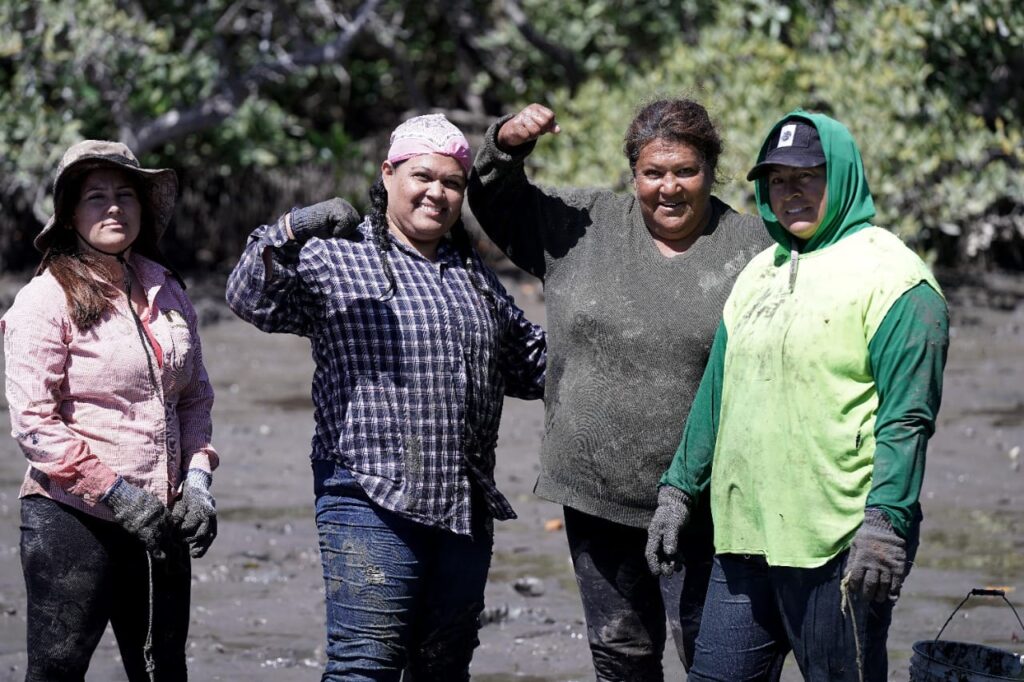It has not been easy, but little by little, the struggle that 40 women from the municipality of Navolatoon the central coast of Sinaloato recover the chocolate clamThe second most valuable fishery in the region.
Yanett Miranda Castro Medina is the one who since 2016 has been leading this battle. Raised in AltataIn a family of fishermen, Yanett has dedicated her whole life to clamming and she felt that the price they were paid was unfair and that they could not have the opportunity to organize themselves, as the men did, despite having the same rights.
In 2016 he entered a training program of the non-governmental organization. Environmental Defense Fund (EDF) and for the closing he presented the project of formalizing an exclusive women's cooperative, since he knew of other women's groups that were also dedicated to clamming, but were not organized.
"I chose to formalize my cooperative and at the same time I invited these other women, because we are three cooperatives that were born together with the same project but we are separated because we are from different fishing communities," she explains.
This is how the sister cooperatives had their origins. Almejeras de Santa Cruzof Altata, with 9 associates; Las Lobas del Manglarof Las Aguamitas, with 14 members, and The Banas Guerreras del Marof Dautillos, with 17 members. The first two are users of the Bahía de Altata-Ensenada El Pabellón Lagoon System and the last of the Bahía Santa María Lagoon System.
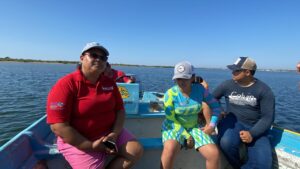
It was not an easy road
In a sexist state and within a male-dominated activity in which the participation of women has historically been undervalued, formalizing an exclusive women's cooperative was not going to be an easy task, acknowledges Castro Medina.
"They told me 'where did it occur to you, woman, in the most macho state, to start wanting to change history,' and it took a lot of work to get the deeds for the cooperative, to notarize us, because we had no money and that's not cheap," she says.
He recalls that they came from not earning a fair wage for their work and what they did was work for a year with the National Commission of Natural Protected Areas (Comisión Nacional de Áreas Naturales Protegidas) (Conanp) cleaning estuaries and beaches, to raise the money to pay for the deed to the cooperative.
"After that, we were unable to get the permits, because we ran up against machismo, with people who had been in control of things in the fishing industry all along and they didn't like it. We spent two years applying for the fishing permits and they didn't come out, we were going around, collecting money to renew the applications, going back and forth to Mazatlan with only the ticket, without even having enough money for a glass of water, so that the papers would arrive there, because they were always halfway there and never arrived", he says.
In 2017 they managed to formalize the cooperatives, but it was not until July 2019 that they managed to get permits for clam extraction, he expresses.
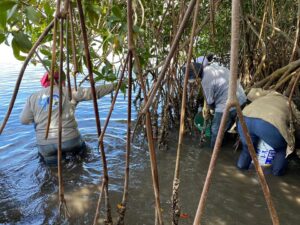
To the rescue of the chocolate clam
Yanett Castro Medina has a 12-year-old daughter. Despite living in an area where in the past up to 20 tons of chocolate clams were extracted daily, her little girl knew and tasted this mollusk until she was 7 years old, because for a period of 10 years there was no production.
With the help of EDF and with the support of governmental institutions such as Conapesca, Inapesca e IsapescaThe clam cooperatives created a shelter for the rescue of the chocolate clam.
He maintains that through the training with EDF, they recognized the importance of conservation and care of the bays and their species for fishing and the people who depend on this activity.
For this reason, they began to promote the care of the beach and undertook cleanup work in the estuaries, with the purpose of recovering this resource that they no longer had in the Bay of Altata.
"We made a refuge zone of one hectare, with 600 meters of buffer, it is a zero fishing zone, no one can enter there to fish, and although it is a small area and has been monitored since it began, we have seen results," says Yanett.
He adds that since they became involved in this process we began to generate monitoring and today they do have data from the bay, from each clam bank, how it is moving, temperatures, water movements, salinity and PH.
"We can say that we became scientific fishermen, because we joined the monitoring part, where we were taught that kind of thing and that gives you reliable, current data, and not only what Inapesca could present to us," he says..
In an effort to recover the chocolate clam population, there is currently a three-year ban on this species, which ends in September of this year.
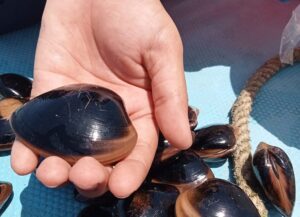
Sustainable fishing is the future or there will be no activity
He knew nothing about sustainability, Castro Medina acknowledges, because he was born with the idea that the sea is taken and taken and nothing is ever returned.
"EDF also taught us that and that is when we started to work on cleaning beaches, worrying, beyond being fishermen, about returning a little bit of well-being to what feeds us, guaranteeing that future generations at least have the same opportunity as we do to know this fishing resource and to eat it," he says.
Castro Medina stresses that responsible and sustainable fishing is not only for the well-being of the families that depend on this activity, but also for future generations.
"I look to the future in the sector doing sustainable fishing and if not, there is no future, because we cannot continue doing the same thing that our parents and grandparents taught us and expect different results. I believe that before it was not applied because it was not necessary, the problem of our ancestors was to find a market and the new problems of the sector is that there is less and less to fish, that there are more and more of us in the sea", he reflects.
Castro Medina stresses that the members of fishing organizations where an NGO has not worked do not even recognize the concept of sustainable fishing and if something is not done to change the way of thinking that the sea's species will never run out, the future of fishing will be at risk.
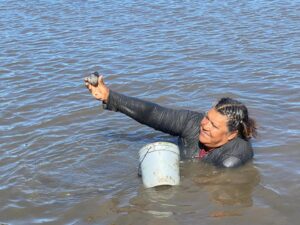
In search of preferential markets
The three clamming cooperatives on the Navolato coast are already well organized and settled, now the only step left is to find commercial partners who value the effort of fishing in a sustainable way, says Yanett.
"That is the step we are looking for, we still do not see those preferential markets for the fact of selling a sustainable, organized product, of being responsible with the environment, that is the stage we are at after almost 10 years of struggling and searching, because when we started we had nothing, we only had the desire, but we did not know how or all the effort that this was going to take us," he says.
They have already knocked on the door of Smartfish on two occasions and are convinced that one day they can be allies, however, they have not yet been able to achieve this, she says.
"Right now we are at a turning point where people are motivated, because they say 'hey, I still don't see the reflection of so much effort and so much expense for being regulated and that there is no preferential market for the resources that are fished in a sustainable way'," he comments..
For Yanett, at this point, working in a sustainable manner should be an obligation for all fisheries, with well-established traceability models. In this way, coastal communities will be able to continue to take advantage of the resources provided by the sea and improve their living conditions.

